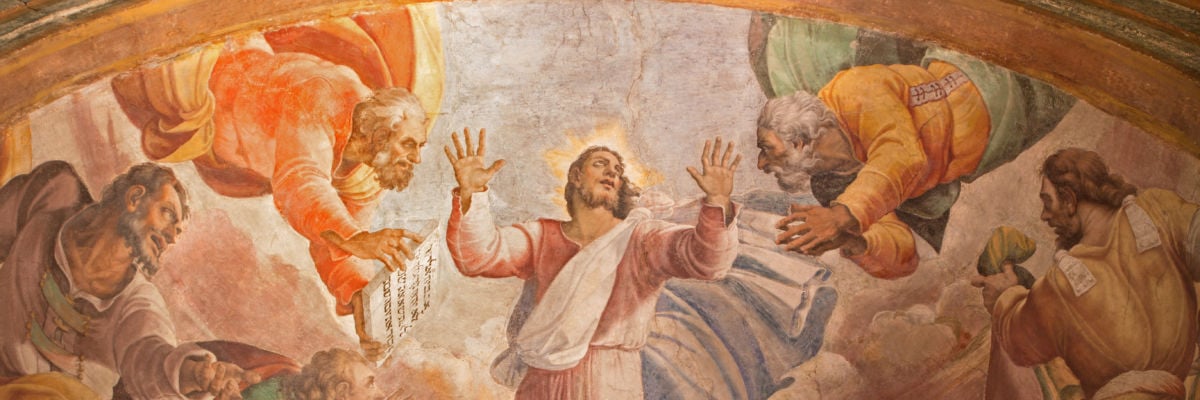
Homily for the Second Sunday in Lent, 2021
Jesus took Peter, James, and John
and led them up a high mountain apart by themselves.
And he was transfigured before them,
and his clothes became dazzling white,
such as no fuller on earth could bleach them.
Then Elijah appeared to them along with Moses,
and they were conversing with Jesus.
Then Peter said to Jesus in reply,
“Rabbi, it is good that we are here!
Let us make three tents:
one for you, one for Moses, and one for Elijah.”
He hardly knew what to say, they were so terrified.
Then a cloud came, casting a shadow over them;
from the cloud came a voice,
“This is my beloved Son. Listen to him.”
Suddenly, looking around, they no longer saw anyone
but Jesus alone with them.-Mark 9:2-10
Brothers and sisters:
If God is for us, who can be against us?
He who did not spare his own Son
but handed him over for us all,
how will he not also give us everything else along with him?Who will bring a charge against God’s chosen ones?
It is God who acquits us, who will condemn?Christ Jesus it is who died—or, rather, was raised—
who also is at the right hand of God,
who indeed intercedes for us.-Rom. 8:31b-34
“But what were they talking about?”
The second Sunday of Lent each year always recalls the Transfiguration of the Lord Jesus; in old rite and new, it is a truly universal commemoration of the Savior’s revealing of his glory.
St. Mark’s Gospel may leave us with a question hanging. We know what God the Father said, and we know what St. Peter said, but what was Jesus talking about with Moses and Elijah?
St. Luke’s account of this event tells us the answer, but we don’t have to wait for next year’s reading during the Luke cycle (known unpoetically as “year C”) to find out. Spoilers being allowed in the mysteries of faith, where we are told how it will all end, I can share that Luke tells us that the Savior was discussing his passion and resurrection and glory to be accomplished in Jerusalem, as these were foretold in the law (Moses) and the prophets (Elijah). It is only human that, being the only members of our fallen race given the grace to see the Savior before his descent among the dead on Holy Saturday, they would want to hear the good news of his incarnation, death, resurrection, and coming again, and go back and spread this gospel among the waiting dead.
But even this Sunday of the Mark cycle, the answer is already given to us in the lesson today from St. Paul’s epistle to the Romans. There we hear, “Christ Jesus it is who died—or, rather, was raised— who also is at the right hand of God, who indeed intercedes for us.”
You see, these mysteries of salvation were Our Lord’s only real topic of conversation, his only real goal and concern from the moment of his incarnation in Mary’s womb to the endless ages of the “praise of his glory.”
This was what he said as he came into the world, as we read in the epistle to the Hebrews: “A body you have made for me…behold, I come to do your will, O God.” This was discourse as he explained the necessity of his passion and resurrection to his apostles—right after this scene in Mark’s Gospel, as if to continue the teaching he had bestowed on Moses and Elijah in the cloud.
This was his expressed desire as he instituted the Holy Eucharist as a sacrificial offering and perpetual memorial and showing forth of his passion and glory.
This was his deep explanation after his resurrection as he revealed, to the disciples on the road to Emmaus, the meaning of the scriptures from Moses and the prophets and the psalms on how the Christ must have suffered to enter into his glory.
This is his intention as the principal priest at every Holy Mass, which applies and uses the power of his suffering and glory for us throughout time until he should come again. This means that he is thinking of this and us right now and on every altar and in every tabernacle.
Of all the four great mysteries of our salvation listed by the apostle here—Christ’s death, resurrection, glory, and intercession for us before the Father’s face—this last is the most immediately comforting to us, providing an unlimited source of confidence for perseverance in following our good Master: he prays for us, he intercedes for us! Do you think that Christ prays for those whom he intends to condemn? Paul doesn’t answer his rhetorical questions, because to him the answer is obvious, but if you need more, then St. Thomas Aquinas gives a clear, Latin non! as his answer in his commentary.
Christ’s intercession for us as our advocate “who ever lives to make intercession for us” as the apostle says in the epistle to the Hebrews, is in a real sense the most powerful of the four mysteries given. For his intercession contains all of the mysteries that were accomplished in his sacred humanity.
St. Thomas puts it this way: “He interceded for us by representing to the Father’s gaze the humanity assumed for us and the mysteries which were celebrated in it.”
Notice the liturgical language of “celebrated mysteries.” The Mass, and indeed in due measure the whole worship of the Church, is a continuation in time of the work of Christ’s saving grace in his holy humanity. It is where we share most intimately in Christ’s intercession for us, where he reveals his divine plan by placing in our very bodies the body and blood, sacrificed and glorified, that he offers for us, so that he prays within us, using his and our own humanity.
Truly, if such a one is our God, who can be against us? Let us take heart.



